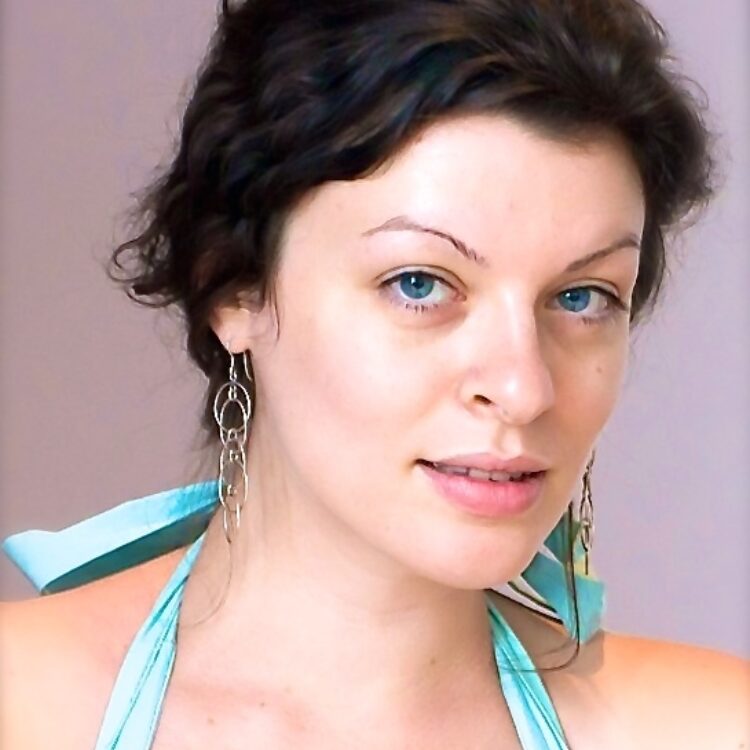Makeshift Castle
Julia Adolphe was born May 16, 1988, in New York City, and lives there. Her Makeshift Castle was commissioned by the Boston Symphony Orchestra, Andris Nelsons, Music Director; and Gewandhausorchester Leipzig, Andris Nelsons, Gewandhauskapellmeister. She began the piece in 2020, but its premiere was delayed and she meanwhile rethought the piece somewhat, completing the final version in May 2022. The BSO and Andris Nelsons gave the world premiere at Tanglewood on July 29, 2022.
The score of Makeshift Castle calls for 2 flutes (2nd doubling alto flute/piccolo), 2 oboes (2nd doubling English horn), 2 clarinets (2nd doubling bass clarinet), 2 bassoons (2nd doubling contrabassoon), 4 horns, 3 trumpets, 2 trombones and bass trombone, tuba, timpani, percussion (2 players: glockenspiel, cymbal, sizzle cymbal, tam-tam, claves, wood blocks, bongos, snare drum, 4 tom-toms, 2 log drums, bass drum), harp, piano, and strings (first and second violins, violas, cellos, and double basses). The piece is about 15 minutes long.
Julia Adolphe grew up in New York City with artistic parents—her father a painter, her mother an architect. Her childhood was broadly influenced by art and culture, and she gravitated particularly toward performance. She started inventing music as a child, before any formal lessons in music, and after beginning piano lessons began writing songs for guitar and voice for herself to perform.
Adolphe attended Cornell University, where her composition teacher was the Pulitzer Prize-winning composer Steven Stucky. Stucky’s strong connections to the Los Angeles area—he was the LA Philharmonic’s resident composer for over a decade and administered that orchestra’s Green Umbrella new music series—led Adolphe to relocate to the West Coast, where she worked with Stephen Hartke at the University of Southern California’s Thornton School of Music.
Adolphe began to receive national attention when her Dark Sand, Sifting Light was premiered by the New York Philharmonic for its Biennial in 2014. That orchestra followed up with a commission for her viola concerto Unearth, Release, premiered in 2016. She has a strong continuing relationship with the Los Angeles Philharmonic and its music director Gustavo Dudamel, who commissioned her orchestral work Underneath the Sheen (2018), her cello concerto Chrysalis (2020), and more recently the violin concerto Woven Loom, Silver Spindle, premiered in December 2021. The Cincinnati Symphony Orchestra and music director Louis Langrée commissioned and premiered her Paper Leaves on Fields of Clay (2020). She has also written an “opera for all ages” on Jules Feiffer’s novel A Barrel of Laughs, a Vale of Tears, with a libretto by Stephanie Fleischmann, and a chamber opera, Sylvia, premiered at Brooklyn’s Bargemusic in 2013.
Adolphe is an open and active communicator about music, the career of a composer, and countless other subjects via her LooseLeaf NoteBook videocast. Recent episodes with composer Frank Ticheli and mezzo-soprano Sasha Cooke deal with such artistic (and everyday) stumbling blocks as imposter syndrome and overcoming anxiety. She was involved as an instructor of music in the Cornell Prison Education Program, teaching inmates at the maximum-security Auburn Correctional Facility in New York State. She documented much of her experience on New Music USA’s NewMusicBox website.
Adolphe’s music is characterized by surprising and dramatic use of instrumental color and dynamic interaction among the players. She is especially accomplished as an orchestral composer. The titles of most of her pieces are evocative and imagistic, but she notes that these, while apt, typically don’t indicate specific programmatic narratives in the Straussian sense but rather offer something to orient the listener. The title of her violin concerto Woven Loom, Silver Spindle was inspired by the bright, precise nature of the violin’s sound and its interaction with the orchestra.
Commissioned by the BSO and the Gewandhausorchester Leipzig, Makeshift Castle was originally to have been premiered in Boston in January 2021, but pandemic-related delays allowed Adolphe to continue refining the piece until it reached its final state in 2022. It ultimately became a two-movement piece the composer describes as representing “contrasting states of permanence and ephemerality, of perseverance and disintegration, of determination and surrender.” The titles of the two movements, “Sandstone” and “Wooden Embers,” suggest the dichotomy, though it’s not an entirely simple question of permanence versus ephemerality. There is considerable dynamism and change in “Sandstone.” The movement opens with deep bass and sharply accented percussion giving way to a short, quiet, but anticipatory passage. The body of the movement engages the full orchestra, particularly the brass, with sporadic, pounding percussion creating a sense of both power and unpredictability. Within the massed instrumental sound, the music remains detailed and mercurial, a characteristic that continues into the following very quiet, sustained, and transparent episode that closes the movement.
This transparency continues into “Wooden Embers.” The
important melodic line of the English horn leads us into a different expressive
space, but nuance and detail are still present in the lighter percussion and
shimmering changes in orchestration. The music’s transformation occurs as a
gradual expansion eventually encompassing the full ensemble. As in “Sandstone,”
the movement closes with a long, quiet passage. Short, lyrical fragments form a
mosaic of instrumental colors that eventually dwindle to a lone clarinet.
Robert Kirzinger
Composer and writer Robert Kirzinger is the Boston Symphony’s Director of Program Publications.

